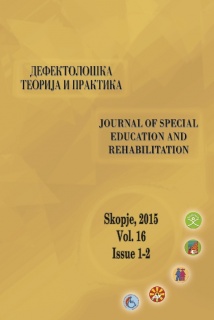Marketing
April 7th 2015 Vol. 16, issue 1-2 is published
Dear readers,
Writing scientific papers is a way of communication in science. Scientific papers are published in scientific journals. One such scientific journal in thousands world’s journals is our journal Special Education and Rehabilitation, which tends to follow the trends. In the small scientific environments such as the Republic of Macedonia there are many factors that hinder the work and reduce the actual quality of the scientific journals. When the state invests only 0.3% of GDP in science, then you can not expect a serious scientific achievement of the Macedonian scientific journals. These small magazines always have a big problem in providing high-quality papers that would later be widely quoted and would provide a factor of influence of the scientific journal. The state requires high criteria of the teaching staff and publication of papers in journals with high impact factor, but it does not provide any access to the database Web of Science. Inevitably there is an impression that the welfare state and high science do not go together hand in hand. When you add the illogical moves of the publishers for reduction of the remuneration of the members of the publishing office and the moves for selection of the printing office that are not to the taste of the main editors, then you can conclude that in order to become a successful editor of a ultimate scientific journal in a small scientific environment as Macedonia is a mission impossible. The Ministry of Education and Science have to find additional resources and to increase the funding of scientific research projects and to invest more in international journals with domestic origin, so they could acquire a factor of influence in the near future.
Let us look briefly at this issue 1-2 2015. In the first rubric Special Education and professional problems this time is represented by domestic authors. My colleague Daniela Dimitrova-Radojichikj writes about Concepts of colors in children with congenital blindness, and the authors Rashikj-Canevska and Chichevska-Jovanova process some determinants of the quality of life in patients suffering from multiple sclerosis. In the rubric medical treatment there is a paper by the author Dobrinka Georgieva coming from Bulgaria. It examines the multidimensional outcome and long-term evaluation of non-avoidance therapy in stuttering. In the rubric Psychological-Pedagogical review there are two papers by authors from the United States that cover the following topics: An evidence-based analysis of self-regulated strategy development writing interventions for students with specific learning disabilities and the second Passing standardized assessments with fading prompts. Authors from Croatia in the rubric devoted to practical work represent the guided reading program for prisoners. In the last rubric Experiences and News Indian authors introduce the topic Does father involvement influence the affect, language acquisition, social engagement and behavior in young autistic children?
In the rubric News and Information readers will find information on the eighth international conference Special Education and Rehabilitation today held in Belgrade, Serbia. Then, Ana Petkovska writes about the 3rd meeting on rare disease in South-Eastern Europe held in November 2014 in MASA Skopje. Finally, the News end with a project report: Program for full socialization of children with special needs into their communities submitted by Jasmina Troshanska. Then, there is an abstract of a master's thesis defended by the colleague Sashka Trajkovski entitled Ability of self-advocacy of people with intellectual disabilities.
With respect,
Editor-in-Chief
Post je objavljen 10.04.2015. u 08:56 sati.
